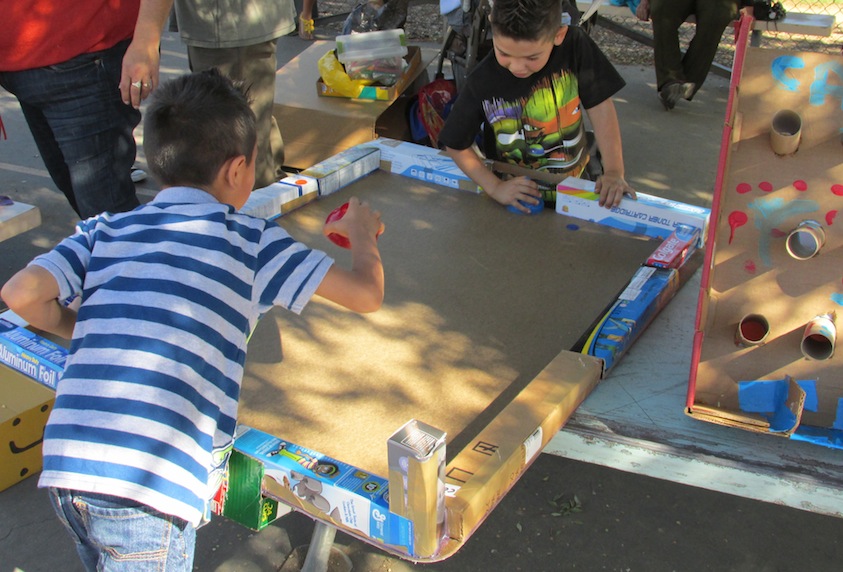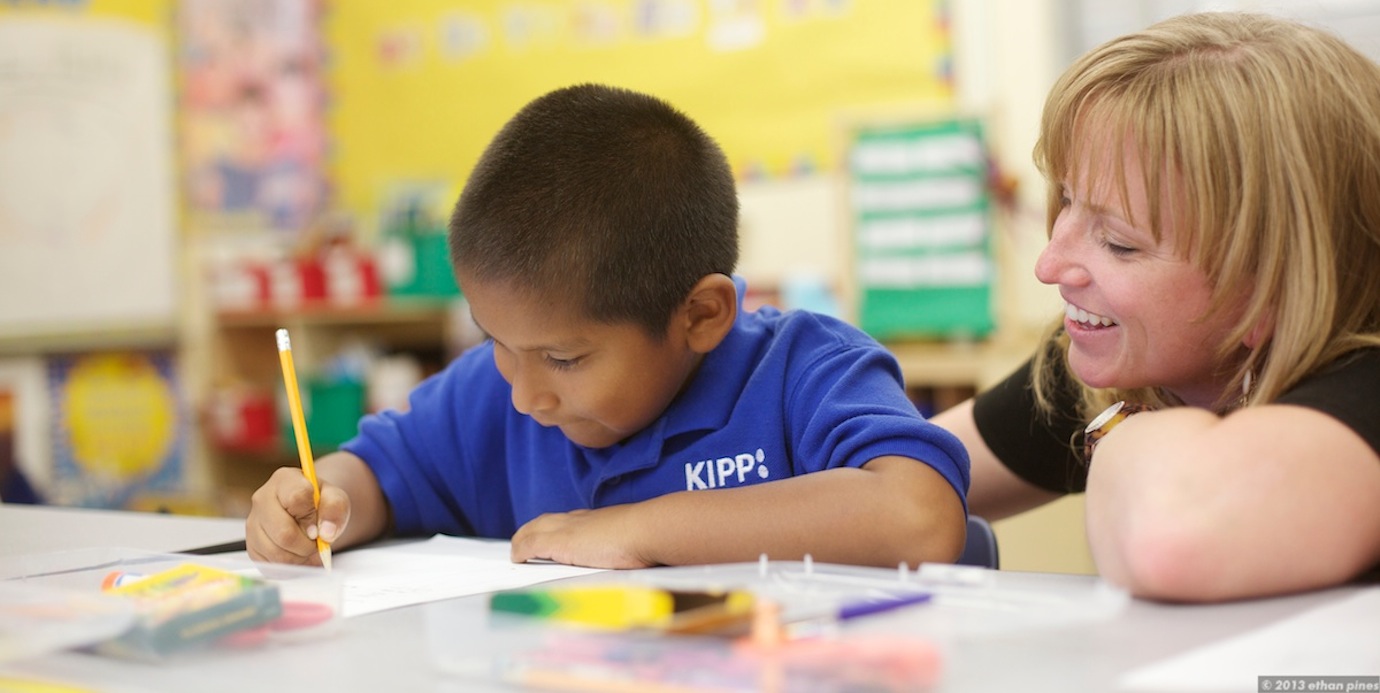On a stifling hot day in East Los Angeles, Mara Bond walks us through the maze of classrooms that make up KIPP: Iluminar Academy. Her blonde hair is swept into a loose ponytail. She’s eager for us to step inside. We first enter a classroom where kids are huddled around their teacher on the edge of a checkered carpet. The room is a burst of color—red, blue, and green.
Kids’ artwork is on display, and all the children wear bright blue KIPP: Iluminar polo shirts tucked neatly into their khaki pants.
The teacher asks the students loudly, “What do we have?”
The kids shout, “Imagination!”
“And what do we do with it?”
“Innovate!”
Bond’s eyes light up. As the founder of the K-1 school established in 2013 (which will eventually be K-4), the idea of using imagination and critical thought to make change in the world is something she hopes to instill in all of her students.
This new school is one of the 162 Knowledge Is Power Program (KIPP) college-prep charter schools in America. The national network has an impressive track record of preparing kids in underserved communities for success in college and in life. According to their 2012 report card, KIPP students graduate from college at four times the rate of their counterparts in economically challenged communities.
What’s also special about KIPP is that each school has a unique identity and a specific focus. Some schools are focused on STEM (science, technology, engineering, and math), for example. Others, like KIPP: Iluminar, are about infusing creativity and the arts into children’s education.
The goal at KIPP: Iluminar, Bond says, “is for our students to really own this idea of ‘what is an innovator?’ ‘what is imagination?’ and how does imagination lead to innovation.”
“Learning,” Bond says, “should not be an experience from the shoulders up, but a whole-body experience. Igniting one’s imagination is a big part of that.”
One of the ways the teachers at KIPP: Iluminar do this is through their innovation stations. Three times a week, for 30 minutes, students create and explore with arts and crafts in the classroom.
But this block isn’t just “let’s play with toys time,” Bond says.
If students in kindergarten are learning about communities, for example, they might build a community with blocks or put together a community-themed puzzle. Or if they are studying life cycles, they can use this time to act them out with classmates or draw an artistic representation.
The instructors also teach the kids a set of character strengths—love, grit, zest, self-control, and curiosity. “Grit, zest, self-control, and curiosity,” Bond says, “came out of the research done by Martin Seligman and Christopher Peterson as key strengths that are linked to success in college and life.”
Love, Bond says, is “especially important and very special to KIPP: Iluminar Academy.”
“I believe that if we… radiate love for others in a school, we will inspire compassion. I also think that children learn best in a loving environment. Also, to be completely honest, I truly love and care for each of my students and staff members. This is an extended family for me. It is much more than a job.”
Shadi Seyedyousef, the founding apprentice teacher for first grade at KIPP: Iluminar, says she and the other teachers feel the same way. “It is so exciting to see how such little people can come up with such big ideas!” she says of her students. “The creativity that blossoms when you let kids be who they are and have fun learning is incredible to watch in action.”
Creating That Special Bond
To help put this learning into action, Bond did something that many people told her was both “crazy” and “impossible.”
For three months, before the 2013-14 school year started, she went to all 227 students’ houses for a home visit to get to know the kids and their families.
Despite the resistance, Bond said passionately, “I couldn’t not do this.”
“I had to know the kids on the first day. I had to balance out classrooms and I had to think about kids who are going to inspire each other.”
At each visit, she asked the parents to tell her a little about their children—what they love, what they are good at, and what they want to get out of school. Then they would talk through the commitment to excellence and sign a document that is a collective promise to work together as a team to do whatever it takes to make sure their child is set up to be successful on the journey to and through college.
The home visits for the most part went very well, but one visit left her feeling concerned.
When Bond went to the home of one six-year-old, she observed that he “didn’t know how to spell his name, didn’t know his letters, and seemed to hate school.”
During the first few days of classes, he had a terrible time. “Every day for about an hour, he was screaming or crying. He didn’t want to be here,” Bond says.
She learned that he suffered trauma at his last school, and decided what he needed was a fresh start. With a lot of time, effort and positive attention from her team of teachers, he began to see school as a safe and fun place.
“He is now one of the kids who walks in with a big smile on his face,” Bond says.
This six-year-old wasn’t the only student who was behind before entering KIPP: Iluminar.
The first graders, for the most part, started the year without knowing how to read and write, and they barely knew their sounds and letters. After just a few months of being at KIPP: Iluminar, kids were making “a complete turnaround,” Bond says.
Education in East Los Angeles
In East Los Angeles, where the school is located, the high school graduate rate has statistically been very low. As of 2011, according to City-Data.com, 52.4 percent of East Los Angeles residents did not graduate high school.
“The gap exists because of how [kids] start and because of expectations,” Bond says.
In general, families in the community don’t have a lot of options for education. At KIPP Raíces Academy in East Los Angeles, where she worked in 2008, there were between 50-80 kids on the waitlist. During the next lottery the waitlist was 150 students, and the following year, that number reached 300.
“I went to all the lotteries and always left crying,” she says. “I couldn’t stand seeing so many parents being like, ‘what are my options?’ ”
This led Bond, who grew within the KIPP network from a founding member of the KIPP Raíces kindergarten team in 2008 and later the school’s dean, to start a KIPP school of her own.
“I wanted to prove what this kind of school could actually do for kids.”
Creativity in Action
As we continue on our walk around the school we see more of the positive impact KIPP: Iluminar is having on the kindergarten and first graders from East Los Angeles.
We step into a hip-hop class to see kids dancing in unison and a music education class where students are singing along with their teacher. Kids are preparing for their end-of-the-week show. Every Friday, a class performs a number for the entire school.
Next, we head down to the outdoor area in the center of campus where Seyedyousef is teaching kids about sound waves and vibration using the classic string-cup telephone experiment.
Kids’ eyes are wide and they shout with surprise as they take turns with a cup against their ear and hear the voice of their partner at the other end of the string.
Seyedyousef is also the teacher who brought the Global Cardboard Challenge to KIPP: Iluminar.

Two students play cardboard air hockey during the 2013 Global Cardboard Challenge. (Photo: KIPP: Iluminar)
With the school placing so much emphasis on creativity and imagination, she felt this event would be a perfect fit. The kids constructed and played all kinds of games, including a big wheel like the one seen on the game show The Price is Right, a skee ball machine, an air hockey table, and an archery game.
She says about bringing the challenge to her school: “If Caine can do it, why can’t all of our kids be doing things like that?”
This mentality is what the Imagination Foundation admires so much about KIPP: Iluminar. For Bond and the teaching staff, the creative potential of children is limitless. And as Seyedyousef says, everyone at their school believes “that all kids can–and will–learn and succeed.”
Join the Passion is Power: KIPP Google Hangout
Take part in our chat with KIPP Iluminar’s Mara Bond, Wheda Carletos from KIPP Vision Primary in Atlanta, Jenna Molinski from KIPP Memphis, and other KIPP school leaders about the challenges and rewards of starting and leading a school. What does it take to go from teaching a class to running a school, and what do you do when you’re given the freedom to build that school–and its culture–from the ground up? The Google Hangout will be broadcast live on Tuesday, August 5 at 3 pm PST / 6 pm EST. Tune in here (and share your questions in the comments section).
This story was written by Jenny Inglee, the Imagination Foundation’s Imagination Curator and The Storybook Editor. The first collection of stories in The Storybook focus on the work of inspiring individuals, schools, and organizations that participated in the 2013 Global Cardboard Challenge.


Recent Comments